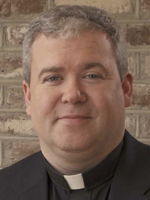Editor’s note: This is part of a series for Lent.
The challenge to understand mercy and to forgive others can be daunting tasks. We are each called to be heralds of mercy, and yet this is oftentimes easier said than done. We all need God’s grace, and positive examples to help us.
The life of Edith Stein, later Sister Teresa Benedicta of the Cross, can be a model to us. As she understood it, her entire life was a gift of mercy.
Edith was born into a large Jewish family in 1891. When she was two, her father died. She saw her mother work as a single parent, raising multiple children and providing for the family. This witness of her mother greatly influenced Edith throughout her life.
She was very attentive to her studies and was noted for her brilliance. As a young woman, Edith abandoned any belief in God, and became an atheist. She studied philosophy and served as a nurse in World War I.
After the war, Edith was especially looking for the meaning of life and for the purpose of things. She began to look and search for truth.
She served as an assistant to Edmund Husserl, one of the founding philosophers of phenomenology. It was a new school of thought, and working for Husserl was a great honor.
After Husserl, Edith experienced blatant sexism and anti-Semitism in seeking university positions. She was passed over for job opportunities and promotions because she was a woman and a Jewish person. She worked to change these views and to establish her place as a philosopher and professor.
In 1922, Edith read the autobiography of St. Teresa of Avila through the night, and in the morning, she declared, “This is it. I found it.”
Edith found the truth. Her unbelief collapsed, and Jesus was able to reveal to her the light of his mercy. Shortly afterwards, she accepted Christian baptism. Her mother did not understand, and there was tension between the two of them for many years. This was a great cross for Edith.
Her discipleship deepened, and she eventually felt called to become a Carmelite sister in Cologne, Germany. She took the name Teresa Benedicta of the Cross, since she saw herself as someone like St. Teresa of Avila, and as one “blessed by the cross.”
The Lord Jesus tells us, “Blessed are the merciful, for they shall obtain mercy” (Mt 5:7). Sister Teresa Benedicta understood this truth, and she saw the inner dynamism and gift of mercy, as well as its connection with suffering. She knew that mercy was not simply the removal of sin, but the showing of divine favor. This holy Carmelite understood her life as a gift of mercy, and realized her vocation to be a herald of that mercy.
The rise of the Nazi party and its growing persecution of the Jewish people and of Jewish converts to the Christian faith caused Sister Teresa Benedicta to transfer to a convent in the Netherlands. Her biological sister, Rose, also became a Carmelite sister and followed her.
After the heroic denunciation of the Nazi regime by the Dutch Bishops, the Gestapo sought out Jewish converts, and came for Sister Teresa Benedicta.
When they went to the convent and asked for Edith Stein, the mother superior informed them that there was no such person by that name. When they went the second time — and arrested Edith and her sister — they questioned the mother superior about her supposed lie.
“That is not Edith Stein. That is Sister Teresa Benedicta of the Cross!” she responded.
When Rose began to cry at their arrest, Sister Teresa Benedicta told her, “Come, Rose, we go for our people.” She chose to be a herald of mercy in the midst of bigotry and violence. She prayed and offered her life and death for the salvation of the Jewish people and the conversion of Germany.
Sister Teresa Benedicta lived about a week in Auschwitz before dying in the gas chamber. Survivors later remembered her for her peace and compassion in the death camp, and they likened her to a living pieta, to a living sign of mercy. In our struggles to live mercy and to give it to others, we can find help in the example and prayers of Edith Stein — St. Teresa Benedicta of the Cross.
Father Jeffrey Kirby is a priest of the Diocese of Charleston currently studying moral theology in Rome.

